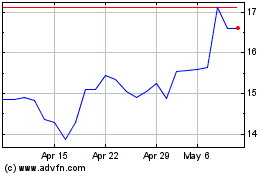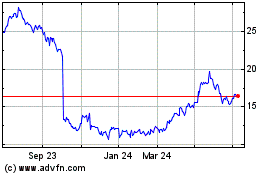EU to Approve GE-Alstom Deal
September 07 2015 - 8:50PM
Dow Jones News
BRUSSELS—The European Union is set to approve General Electric
Co.'s $17 billion acquisition of Alstom SA's power business on
Tuesday, two people familiar with the matter said, putting the U.S.
industrial giant a step closer to clinching its biggest ever
deal.
The EU's green light will put an end to nearly eight months of
wrangling with the U.S. company, which has sought to convince
regulators that the deal won't lead to higher prices for gas
turbines in Europe.
The purchase by an American company of a crown jewel of French
industry was politically charged from the start. Germany's Siemens
AG was pulled into the contest early on by French officials seeking
a European buyer for Alstom. But Paris subsequently changed tack
and lobbied Brussels to approve the deal, said a person familiar
with the matter.
GE eventually offered concessions to Brussels that satisfied the
regulators' concerns. The EU's executive arm is expected to
formally approve the deal at a meeting in Strasbourg, France, on
Tuesday, the people said.
The final major hurdle to the merger—approval from U.S.
antitrust authorities—is also likely to be cleared as early as
Tuesday, one of the people said.
It wasn't immediately clear what conditions would be applied. GE
Chief Executive Jeff Immelt said in May he was willing to sell off
intellectual property to secure regulatory approval, but
concessions around the French company's service business weren't an
option.
The Alstom deal is central to Mr. Immelt's multiyear effort to
reposition GE, returning focus to its industrial business units as
it exits the lending business. After the Alstom acquisition and the
sell-off of GE Capital is complete, GE says it will generate 90% of
its profits from industrial business and just 10% from financial
services. As recently as the financial crisis, lending generated as
much as half of GE's annual earnings.
The deadline for the EU's investigation has been extended
several times, and by more than two months, as GE sought to
convince regulators that their initial concerns were misplaced.
The repeated delays stirred up memories of an earlier proposed
GE deal that foundered at the hands of regulators in Brussels—its
failed $45 billion takeover of Honeywell Inc., which the EU blocked
in 2001 after U.S. regulators had given the go-ahead.
When it came to the Alstom deal, the U.S. company pushed back
strongly against Brussels' concerns. GE argued that heavy-duty gas
turbines are sold in a global market by four competing companies,
including Siemens and Mitsubishi Hitachi Power Systems, and that
only 5% of demand is in Europe.
But the EU said only two strong competitors would remain after
the merger.
In June, the EU sent GE a formal list of concerns relating to
the proposed deal. Only then did GE relent, saying in July that it
had proposed concessions that preserved "the economic and strategic
value of the deal."
The U.S. company has complained repeatedly about the length of
the investigation, which it said was hurting Alstom by causing
uncertainty for employees and customers. Experts said GE could have
come forward sooner with an offer to sell parts of the business in
order to allay the regulators' concerns.
The Alstom deal proved difficult and costly to complete for GE.
Over the nearly 18 months in which the American company sought
approval from various European regulators, GE has repeatedly
reassured investors that the rationale for the purchase is secure.
The company says the installed base of steam turbines it will
receive from Alstom will boost its footprint in emerging markets
even as GE wrings out cost savings by consolidating Alstom's
industrial footprint and its own.
GE is focusing on its heavy industrial roots, like its
businesses making jet engines, locomotives, power turbines and
medical scanners. Mr. Immelt is also trying to sell GE's appliance
business, as the company looks to shed lower-margin, slow-growing
pieces of the company.
Still, Wall Street has remained cool to the deal, with many
analysts who cover GE saying their clients remain indifferent at
best.
People familiar with the company's thinking say that Mr. Immelt
has long felt GE held a crucial trump card as regulators sought
deeper concessions. Without a buyer like GE, Alstom was poised to
fall into even more dire financial straits. Finding a way to secure
the sale to GE will also mean that job guarantees for French
employees of Alstom, and a pledge by GE to add jobs in the country,
will remain in force.
For Mr. Immelt, one piece of his "pivot" is preserved by the EU
decision. What remains, once the deal is closed, is the work of
integrating Alstom into GE, a project Mr. Immelt told investors
early this year would be the most important facing the company this
year, and in the coming years, too. Meanwhile, the company
continues to sell off units of GE Capital, aiming to part with the
bulk of what was until recently a $500 billion banking business by
the end of next year.
Write to Tom Fairless at tom.fairless@wsj.com and Ted Mann at
ted.mann@wsj.com
Subscribe to WSJ: http://online.wsj.com?mod=djnwires
(END) Dow Jones Newswires
September 07, 2015 20:35 ET (00:35 GMT)
Copyright (c) 2015 Dow Jones & Company, Inc.
Alstom (EU:ALO)
Historical Stock Chart
From Mar 2024 to Apr 2024

Alstom (EU:ALO)
Historical Stock Chart
From Apr 2023 to Apr 2024
